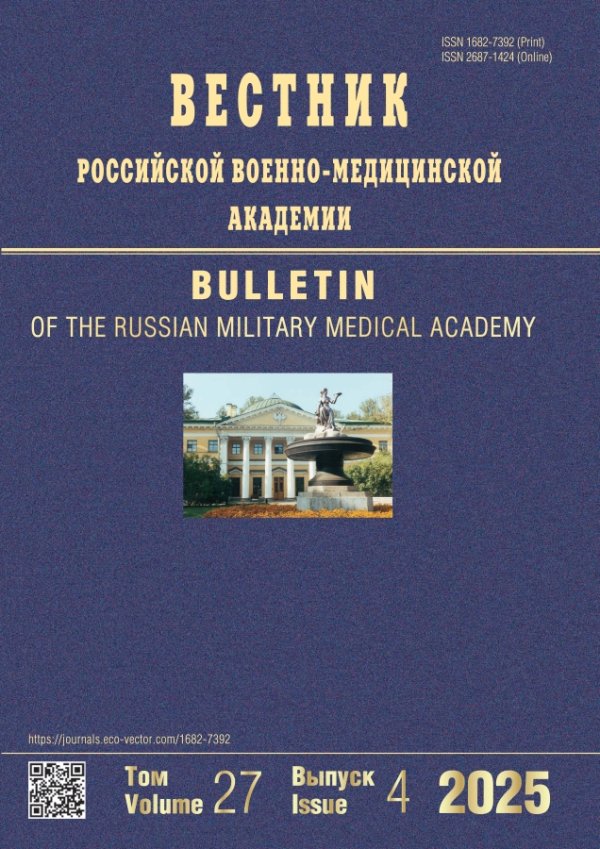Features of adaptation after psychical traumatic stress among servicemen who performed special tasks
- Authors: Zelenina NV1, Nazarov SS1, Marchenko AA1, Rantseva SA1, Vyipritskiy PA1, Yusupov VV1, Kuzmin SG1, Zubov AN1
-
Affiliations:
- Военно-медицинская академия им. С.М. Кирова
- Issue: Vol 20, No 3 (2018)
- Pages: 153-158
- Section: Articles
- URL: https://journals.rcsi.science/1682-7392/article/view/12322
- DOI: https://doi.org/10.17816/brmma12322
- ID: 12322
Cite item
Full Text
Abstract
Full Text
##article.viewOnOriginalSite##About the authors
N V Zelenina
Военно-медицинская академия им. С.М. Кирова
Email: vmeda-nio@mil.ru
Санкт-Петербург
S S Nazarov
Военно-медицинская академия им. С.М. Кирова
Email: vmeda-nio@mil.ru
Санкт-Петербург
A A Marchenko
Военно-медицинская академия им. С.М. Кирова
Email: vmeda-nio@mil.ru
Санкт-Петербург
S A Rantseva
Военно-медицинская академия им. С.М. Кирова
Email: vmeda-nio@mil.ru
Санкт-Петербург
P A Vyipritskiy
Военно-медицинская академия им. С.М. Кирова
Email: vmeda-nio@mil.ru
Санкт-Петербург
V V Yusupov
Военно-медицинская академия им. С.М. Кирова
Email: vmeda-nio@mil.ru
Санкт-Петербург
S G Kuzmin
Военно-медицинская академия им. С.М. Кирова
Email: vmeda-nio@mil.ru
Санкт-Петербург
A N Zubov
Военно-медицинская академия им. С.М. Кирова
Email: vmeda-nio@mil.ru
Санкт-Петербург
References
- Зотов, М.В. Способ оценки эмоциональной устойчивости / М.В. Зотов, В.М. Петрукович, О.П. Журавлева // Патент 2240038 C1 Российская Федерация, МПК 7 A61B5/16. - № 2003134495/14. - 2004. - М. - 24 с.
- Лазебная, Е.О. Преодоление психологических последствий воздействия экстремального (травматического) стресса: посттравматическая стрессовая адаптация / Е.О. Лазебная // Психология адаптации и социальная среда: современные подходы, проблемы, перспективы. - М.: Институт психоло- гии РАН, 2007. - С. 561-575.
- Овчинников, Б.В. Ценности и мотивация в профессионализа- ции военнослужащего / Б.В. Овчинников [и др.] // Вестн. Росс. воен-мед. акад. - 2017. - № 4 (60). - С. 135-139.
- Психиатрия войн и катастроф / под ред. В.К. Шамрея. - СПб.: СпецЛит, 2015. - 431 с.
- A ux e me r y, Y. Po st t ra u ma ti c s t re s s d is ord er (P T SD ) a s a consequence of the interaction between an individual genetic susceptibility, a traumatogenic event and a social context / Y. Auxemery // Encephale. - 2012. - Vol. 38, № 5. - P. 373-380.
- Duan, W. Relationships among trait resilience, virtues, post- traumatic stress disorder, and post-traumatic growth / W. Duan, P. Guo, P. Gan // PLoS One. - 2015 - Vol. 10, № 5.- P. e0125707.
- Hurst, N.P. Comparison of the MOS short form-12 (SF12) health status questionnaire with the SF36 in patients with rheumatoid arthritis / N.P. Hurst, D.A. Ruta, P. Kind // Br. J. Rheumatol. - 1998. - Vol. 37, № 8. - P. 862-869.
- Mattson, E. Personality factors and their impact on PTSD and post-traumatic growth is mediated by coping style among OIF/ OEF veterans / E. Mattson, L. James, B. Engdahl // Mil. Med. - 2018. - Mar 26. - 12 р.
- Murphy, D. Post-traumatic growth among the UK veterans following treatment for post-traumatic stress disorder / D. Murphy, E. Palmer, R Lock, W. Busuttil // J. R. Army Med. Corps. - 2017. - Vol. 163, № 2. - P. 140-145.
- Perkey, H. External validity of the psychiatric diagnostic screening questionnaire (PDSQ) in a clinical sample / H. Perkey, S.J. Sinclair, M. Blais [et. al.] // Psychiatry Res. - 2018 - Vol. 261. - P. 14-20.
- Schubert, C.F. Posttraumatic growth in populations with posttraumatic stress disorder - a systematic review on growth- related psychological constructs and biological variables / C.F. Schubert, U. Schmidt, R. Rosner // Clin. Psychol. Psychother. - 2016. - Vol. 23, № 6. - P. 469-486.
- Steenkamp, M.M. Latent classes of PTSD symptoms in Vietnam veterans / M.M. Steenkamp, A. Nickerson, S. Maguen [et. al.] // Behav. Modif. - 2012. - Vol. 36, № 6. - Р. 857-874.
- Tsai, J. Post-traumatic growth among veterans in the USA: results from the National Health and Resilience in Veterans Study / J. Tsai, R. El-Gabalawy, W.H. Sledge [et. al.] // Psychol. Med. - 2015. - Vol. 45, № 1. - P. 165-179.
- Wisco, B.E. Screening, diagnosis, and treatment of post- traumatic stress disorder / B.E. Wisco, B.P. Marx, T.M. Keane // Mil. Med. - 2012. - Vol. 177, Suppl. 8. - P. 7-13.
Supplementary files







